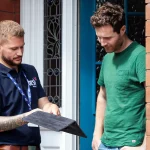Openreach Deploys 5,000th Electric Vehicle as Part of UK Fleet Transition

Network access provider Openreach (BT) has today revealed that they’ve just put their 5000th EV (Electric Vehicle) on the road to support their broadband and phone engineers (up from 4,300 at the start of 2025). The move marks a key milestone on their plan to become a zero emissions business by March 2031.
The operator, which manages the second-largest commercial vehicle fleet in the UK (i.e. 23,000 vehicles), are currently aiming to upgrade the “vast majority” of their diesel-powered vans and cars to EVs by the end of March 2031 (supporting their Net Zero target for the same date). Openreach claims the 5,000 confirmed today are expected to save more than 10,000 tonnes of carbon emissions annually.
To support the transition, Openreach have been installing EV charging points at operational sites and engineers’ homes to support convenient overnight charging. So far, over 2,500 chargers have been installed, making the shift to electric smoother and more accessible for engineers across the UK.
Advertisement
The company has also previously built a partnership with First Bus, so engineers can charge their vans at First Bus depots, taking pressure off public charging points and making life easier for those who live in flats. Most of the network operator’s latest EVs have come from four manufacturers – Ford, Stellantis, Toyota, and Renault (BT and Openreach have previously also purchased some EVs from Vauxhall).
Clive Selley, CEO of Openreach, said:
“As we continue our work to connect homes and businesses to the UK’s most reliable broadband technology, we also want to help build a cleaner, greener future.
We know the impact our operations have, so seeing our 5,000th electric van on the road is a proud moment for everyone at Openreach. By continuing to upgrade our fleet, and by installing EV chargers in our engineers’ homes and our operational sites – we’re removing barriers to adoption, improving air quality, and supporting the communities we serve.”
Openreach now expects to add a further 2,000 EVs to its fleet by the end of March 2026, as well as ongoing investment in charging infrastructure.
Mark is a professional technology writer, IT consultant and computer engineer from Dorset (England), he also founded ISPreview in 1999 and enjoys analysing the latest telecoms and broadband developments. Find me on X (Twitter), Mastodon, Facebook, BlueSky, Threads.net and Linkedin.
« Virgin Media O2 UK to Boost Customer Service with New Lumi AI Tool






















































Openreach can get even more carbon neutral if they stopped using toxic creosote wooden poles for their networks. these poles cannot be re used as creosote is a toxic waste chemical
…And what would you use old decayed telegraph poles for?
Openreach are not the only firm using creosote on poles, Electricity companies such as National Grid, Scottish Power and NIE are only a few of the others. The use of creosote has been extended until March 2026 by the HSE.
They stopped using creosote years ago
“…latest EVs have come from four manufacturers – Ford, Stellantis, Toyota, and Renault (BT and Openreach have previously also purchased some EVs from Vauxhall).”
FYI, Vauxhall are part of Stellantis – I’d be surprised if they weren’t still buying Vauxhalls
I hope these 5,000 are replacements in the normal cycle, otherwise the energy spent in building them will outweigh much of the benefit
They are on a 7 year lease, any that are swapped before the lease expires will be reallocated
an EV in the UK will typically ‘pay off’ its embodied emissions after about 10-15k miles. At that point it’s a net benefit.
And if they did replace vans which were still usable, it’s not as if there isn’t a second hand market for vans…
Fossil vehicles do the most harm through their use. Scrapping even a brand new fossil van and replacing it with an EV is a net benefit to the environment, but it’s far more likely that they will simply replace fossil vans going off lease.
Overnight charging will use a lot of non renewable energy. BT’s estimate of 2 tons of saving on 15 to 20 tons production cost would indicate a struggle to get to net zero within the 7 year lease cycle
Well done, Openreach. Now please use some of them to install fibre in this copper-only urban desert, at loooong last!
My company also a utility, is also in the ideological mindset that BEVs are the only fruit, push for BEVs in their Engineer and fitting fleet, but refuse to install any charging equipment at the employee’s address.
Despite them making several Billion pounds every year, they cannot or will not pay to allow their employees an easy transition to BEVs. This means we have to rely on the woeful charging facilities on site, or expensive public charging. At least OR understands that their decision to transition shouldn’t come at their employee’s cost. Maybe my company can understand that ethic too one day…
Good. Nothing worse than a stinky diesel van ruining a nice walk out with the kids